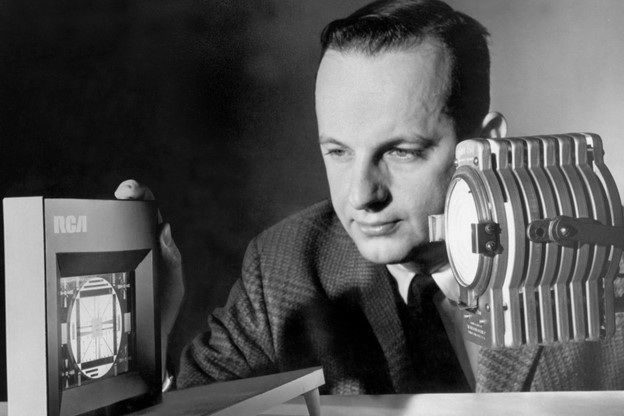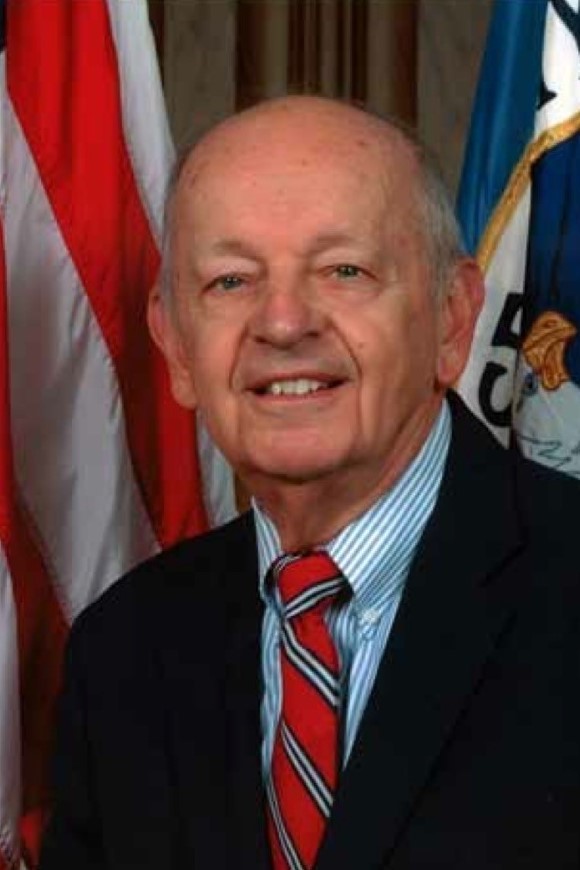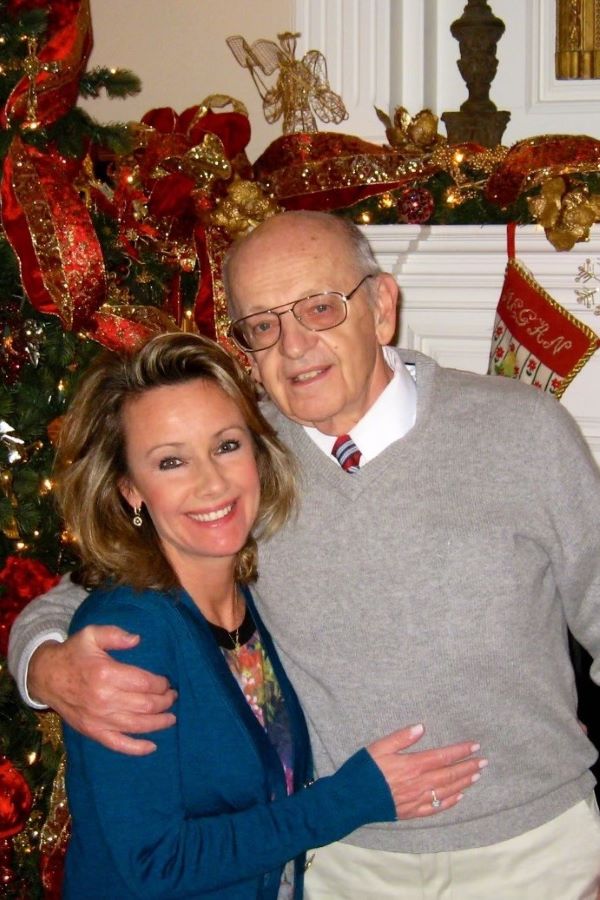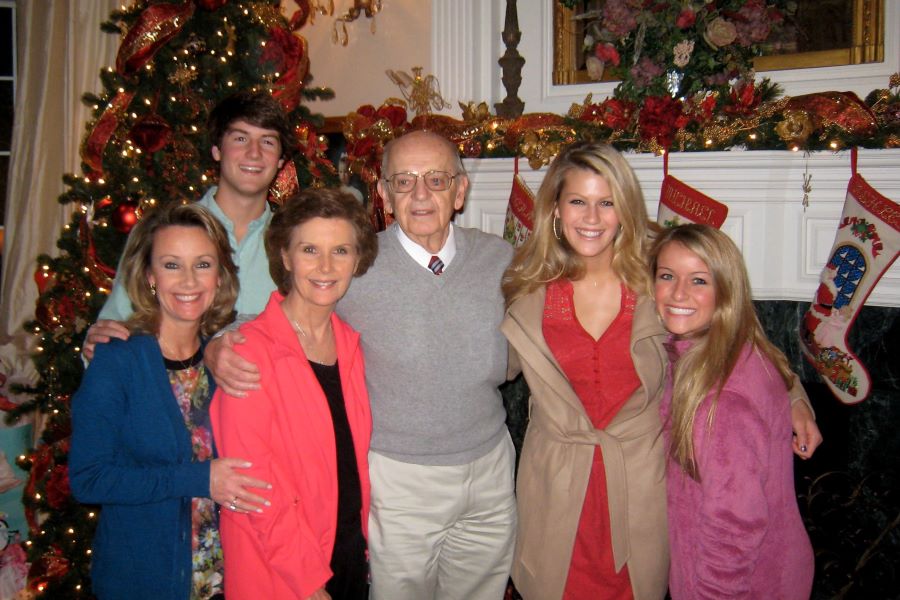$1.5 Million Gift to Baylor University Establishes Electrical and Computer Engineering Chair
The George Heilmeier Chair in Electrical and Computer Engineering honors pioneering contributor to the development of liquid crystal displays (LCD) whose Christian faith animated his life and service

Renowned electrical engineer George H. Heilmeier demonstrates an RCA liquid crystal display (LCD) screen. (Credit: RCA)
Contact: Lori Fogleman, Baylor University Media & Public Relations, 254-709-5959
Follow us on Twitter: @BaylorUMedia
WACO, Texas (April 11, 2024) – Baylor University today announced a $1.5 million gift from the family of George Heilmeier through the Heilmeier-Jarvie Family Foundation, of Plano, Texas, establishing The George Heilmeier Chair in Electrical and Computer Engineering to attract, retain and support innovative research and teaching within the School of Engineering and Computer Science.
The Heilmeier Chair supports the Materials Science initiative within Baylor’s strategic plan Illuminate and qualifies for matching support through the Give Light campaign’s Illuminate Chair Matching Program. The George Heilmeier Chair in Electrical and Computer Engineering is the fourth endowed chair established within the School of Engineering and Computer Science through Give Light.
“Baylor University is truly grateful for the Heilmeier-Jarvie family’s generous support in establishing an endowed chair in memory and in honor of Dr. George Heilmeier,” said Baylor President Linda A. Livingstone, Ph.D. “Dr. Heilmeier’s impact through his life of service is a compelling example of how innovative, impactful scholarship and research do not require an abandonment of our faith. Faith can inspire, and we are grateful for this timely reminder that honors Dr. Heilmeier’s legacy and will support faculty scholars for generations to come.”
The Heilmeier Chair was established by the family of George Heilmeier, an electrical engineer renowned for his early career work leading the team of inventors that created liquid crystal displays (LCD) – a significant advance in technology that led to today’s flat-screen televisions and computer monitors, as well as cell phones and watches. After his successful discoveries in Materials Science, Heilmeier went on to serve his country as director of the Defense Advanced Research Projects Agency (DARPA) after holding positions as a White House Fellow and special assistant to the Secretary of Defense.
The Heilmeier Chair will support the School of Engineering and Computer Science, with the express purpose of attracting and retaining a distinguished Christian faculty member who will further Baylor’s mission through innovative research and teaching that addresses the world’s most challenging problems in the fields of electrical and computer engineering.
“Our family established this endowment to honor the legacy of my father in terms of the impact of his professional career, and, just as critically, of his Christian faith which animated his life and service,” said Heilmeier’s daughter Beth Jarvie, B.B.A. ‘87. “My father was a great innovator, but more importantly, he was a man of deep and abiding faith. Providing resourcing and support for faculty looking to follow in his professional footsteps within an institution that continues to chart its course based upon faith and Christian principles is something that my father would be honored to know is connected to his legacy.”
Deep and abiding faith
A man of deep faith and strong convictions, George Heilmeier came from humble beginnings as the son of a church janitor and homemaker in Philadelphia. His parents, George and Anna Heilmeier, fostered in their only son a commitment to hard work, an attitude of humility and a foundation of deep and abiding faith that would direct and animate the younger George’s personal and professional life.
Heilmeier, who was valedictorian of his Abraham Lincoln High School class, achieved success at all levels of education, earning his bachelor’s degree in electrical engineering from the University of Pennsylvania, followed by master’s and doctoral degrees from Princeton University. In 1962, Heilmeier married the love of his life and wife of 52 years, Janet Faunce Heilmeier, as he embarked on what would prove to be a highly successful career in the field of Materials Science.
Heilmeier’s work as an electrical engineer laid the foundation for many of the technologies that enhance and improve modern life, including his renowned early work in liquid crystal displays while employed at Radio Corporation of America, or RCA, during the 1960s.
“We are deeply privileged to be entrusted with an endowed chair position named after Dr. Heilmeier, whose name and work are renowned in this field,” said Daniel J. Pack, Ph.D., dean of Baylor’s School of Engineering and Computer Science. “When one considers Dr. Heilmeier’s career and life of faith in Christ, along with commitment of the School of Engineering and Computer Science’s to excellence in research and teaching with a Christian worldview, I can’t think of a more appropriate home for The George Heilmeier Chair. We are forever grateful to Heilmeier and Jarvie families for this honor.”
Deep thinker, mentor
After this success, Heilmeier declined lucrative offers from private industry and instead served his country in the 1970s through the U.S. Department of Defense, ultimately leading as DARPA’s director. In this position, Heilmeier managed projects, including stealth aircraft, lasers and artificial intelligence. During this time, he was twice awarded the Department of Defense Distinguished Civilian Service Medal, the highest civilian award given by the department. As a leader, he was known for his commitment to excellence, holding high standards for his employees, while working tirelessly to meet the security needs of the country. He was a deep thinker, who fostered engaging discussions with his staff and those he mentored, guiding them and inspiring a deeper understanding and knowledge of the projects upon which they worked.
After leaving DARPA in 1977 and relocating to Texas for his family, he became the vice president at Texas Instruments, later being promoted to Chief Technical Officer. He later retired from Bellcore, now known as Telcordia, where he led in several roles as CEO and chairman until transitioning to chairman emeritus in 1997.
Beyond his achievements and his service, Heilmeier was known as an unassuming source of support within his community and within his church. A near-constant presence as an usher and greeter, Heilmeier was known for his steady, steadfast faith and humble stewardship of the resources he believed God entrusted to him. At the time of his death in 2014, stories of his quiet generosity to others and of the ways he had ministered to his church community, charities and other institutions illustrated his quiet approach to philanthropy that the family continues to this day through the Heilmeier-Jarvie Family Foundation. George and Janet’s daughter, Beth Heilmeier Jarvie, works with her mother to honor her father’s legacy through the foundation, which supports scientific advancement and Christian causes.
"As much as my father was committed to scientific discovery and advancing the field where he made such a lasting impact, he felt passionately about his Christian faith and supporting Christian approaches to the issues and needs within the world,” Jarvie said. “He loved his family, and while he was a constant, caring presence in our lives, his lasting impact comes from the faith that shaped his life and ordered his steps. We are proud to be able to carry on this legacy through our family’s foundation and through this gift to Baylor.”
Over the course of his career, Heilmeier earned 15 patents and received numerous awards, including the National Academy of Engineering Founders Award, the National Medal of Science, the John Scott Award for Scientific Achievements from the City of Philadelphia, the IEEE Medal of Honor, the Department of Defense Distinguished Civilian Service Medal and the John Fritz Award. In 2005, he also received the Kyoto Prize, Japan's highest private award for lifetime achievement in the arts and sciences.
“I am beyond grateful for the life of George Heilmeier,” said Steve Jarvie, Beth Jarvie’s husband. “Not only was he a wonderful father-in-law and grandfather, but he also modeled his faith, integrity and devotion to me and our family every day.”
The Heilmeier Catechism
As impactful as his contributions were to the fields of Material Science and engineering, Heilmeier’s contribution to research and evaluation through the Heilmeier Catechism continues to be a method taught in higher education, governmental entities and scientific settings throughout the world. Created during his time as director at DARPA, Heilmeier crafted the set of eight questions to help agency officials think through and evaluate proposed research programs. Since its development in the late 1970s, the Heilmeier Catechism has been adapted and taught as an evaluative tool in support of everything from doctoral thesis selection to charitable grant decision making to use in government and private business sectors.
"George Heilmeier was living proof that rational scientific discovery and a deep, compassionate faith are not incompatible,” said Charles Jarvie, Beth Jarvie’s father-in-law. “He lived his faith every day, and he walked the walk. George shared his faith with his family, to whom he was very close. He fashioned a career that literally affects all of us every day for the better.”
At Baylor, the Heilmeier-Jarvie families established the George Heilmeier Chair in Electrical and Computer Engineering to honor Dr. George Heilmeier’s memory and the impact of his work on the fields of Materials Science and Electrical and Computer Engineering. The gift for this endowment was made by the family’s foundation with the support of Janet Heilmeier, Beth Heilmeier Jarvie and her husband, Steve, B.A. ’87, and their three children, Ashley, B.B.A. '15, B.S.N. '16), Megan (TAMU B.A. ’13) and Michael (B.B.A. ’16, M.A. ’16).
Baylor publicly launched the Give Light campaign on Nov. 1, 2018. To date, the campaign has raised $1.48 billion. The campaign has seen 98,358 alumni, parents and friends give to the University’s priorities, as well as establishing 852 endowed scholarships and 46 endowed faculty positions. For more information or to support the campaign, visit the Give Light: The Campaign for Baylor website.
ABOUT BAYLOR UNIVERSITY
Baylor University is a private Christian University and a nationally ranked Research 1 institution. The University provides a vibrant campus community for more than 20,000 students by blending interdisciplinary research with an international reputation for educational excellence and a faculty commitment to teaching and scholarship. Chartered in 1845 by the Republic of Texas through the efforts of Baptist pioneers, Baylor is the oldest continually operating University in Texas. Located in Waco, Baylor welcomes students from all 50 states and more than 100 countries to study a broad range of degrees among its 12 nationally recognized academic divisions.
ABOUT THE SCHOOL OF ENGINEERING AND COMPUTER SCIENCE AT BAYLOR UNIVERSITY
Baylor’s School of Engineering and Computer Science (ECS) has been preparing its students for more than 25 years as innovators for worldwide impact by training graduates for professional practice and responsible leadership with a Christian worldview. Students can choose from majors including bioinformatics, computer science, data science, electrical and computer engineering, general engineering and mechanical engineering. ECS also offers graduate programs in all areas of study within the School. We stand out from the crowd through Christian commitment, R1 research, a strong community, personalized career support, expert accessibility, and leading practical experience. Visit the ECS website to learn more and follow on Instagram and Facebook.


